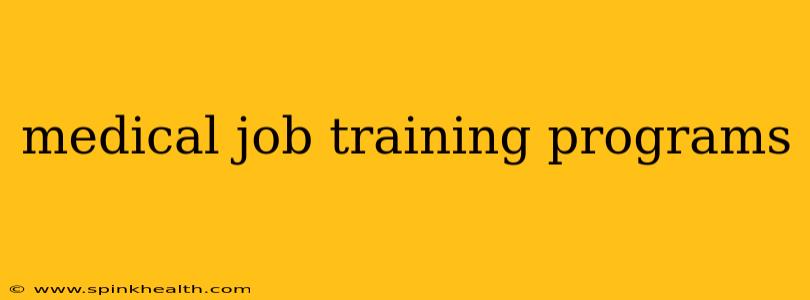Charting Your Course: A Guide to Medical Job Training Programs
The world of healthcare is vast and varied, offering a multitude of rewarding career paths. Whether you're a seasoned professional looking to upskill or a recent graduate seeking entry, understanding the landscape of medical job training programs is crucial. This isn't just about finding a program; it's about discovering the perfect fit for your aspirations and capabilities. Let's embark on this journey together.
My name is Dr. Evelyn Reed, and for over 20 years, I've been involved in medical education and training. I've witnessed firsthand the transformative power of the right program, and I'm here to guide you through the process.
What are the different types of medical job training programs?
The spectrum of medical job training is incredibly wide. It ranges from short-term certificate programs to extensive degree programs. Some focus on specific skills, while others provide a broader foundation. Here are some key categories:
-
Certified Nursing Assistant (CNA): This is often an entry-level program, providing the foundational skills needed to assist nurses in various healthcare settings. The training is typically short and intensive, leading to a certification exam.
-
Medical Assistant (MA): MAs perform a variety of administrative and clinical tasks, assisting physicians and other healthcare providers. These programs often incorporate both classroom instruction and hands-on clinical experience.
-
Pharmacy Technician: These programs train individuals to assist pharmacists in dispensing medications, managing inventory, and providing patient care. Certification is often required.
-
Phlebotomy Technician: This specialized training focuses on the skill of drawing blood, a critical component of many medical procedures and diagnostic tests. Certification is typically a requirement for employment.
-
Emergency Medical Technician (EMT) and Paramedic: These programs prepare individuals to provide emergency medical care in pre-hospital settings. The training is rigorous and involves significant hands-on experience. Paramedics receive more advanced training than EMTs.
-
Associate's and Bachelor's Degrees: For more advanced roles, an associate's or bachelor's degree might be necessary. These programs offer a broader education in healthcare, preparing graduates for roles like registered nurses (RNs), respiratory therapists, and medical laboratory technicians.
How long do medical job training programs typically take?
The duration of a medical job training program varies significantly depending on the specialization and the level of education required.
-
Short-term certificate programs (CNA, Phlebotomy): These can typically be completed within a few weeks to a few months.
-
Medical Assistant programs: These programs generally range from several months to a year.
-
Associate's degrees: These programs typically take two years to complete.
-
Bachelor's degrees: These programs usually take four years to complete.
-
EMT and Paramedic programs: These can vary but typically range from several months to a year or more.
What are the admission requirements for medical job training programs?
Admission requirements can differ substantially between programs and institutions. Generally, you'll need a high school diploma or GED, but some programs may have additional prerequisites, such as:
-
Minimum GPA: Some programs require a certain minimum GPA.
-
Background checks: Many healthcare positions require background checks to ensure patient safety.
-
Health screenings: You may be required to undergo health screenings to ensure you are physically able to perform the duties of the position.
-
Entrance exams: Some programs may require entrance exams to assess your aptitude and knowledge.
What are the job prospects after completing a medical job training program?
Job prospects vary significantly depending on the specific training program and the current job market. However, many healthcare professions are experiencing high demand, offering excellent career opportunities for those with the right training. Always research the job outlook for your chosen field before enrolling in a program.
What is the average salary for medical job training program graduates?
Salaries vary widely depending on the position, experience, location, and employer. It’s crucial to research salary expectations for your specific area of interest before making any career decisions. Websites like Glassdoor and Salary.com can provide helpful insights.
Choosing the right medical job training program is a significant decision. Take your time, research thoroughly, and don't hesitate to reach out to current professionals and program advisors to gather information and perspectives. Your journey to a rewarding career in healthcare starts here. Remember to consider your personal goals, skills, and interests to find the path that best suits you.

